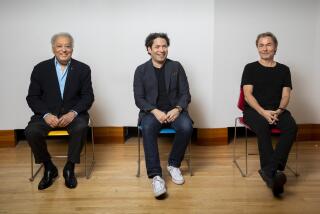Schick: A Percussionist Who Really Feels the Beat
- Share via
Before the 20th century, percussion functioned like the heartbeat of Western music. Usually, it reminded the listener of pulse. When it stood out prominently, it was a sign of musical exertion, of danger or climax. But our century has witnessed the emancipation of percussion from pulse and background. It can now be the actual body of music itself.
In Europe, Stravinsky paved the way for percussion’s liberation, and Varese wrote the first classical all-percussion piece in New York in 1931. But the real revolution took place on the West Coast in the ‘30s with the work of Henry Cowell, whose interest in world music inspired all around him to reconsider the role of percussion in the West; John Cage, who formed the first percussion ensemble; and Lou Harrison, who wrote the first percussion solo.
So it could hardly be more appropriate for the Monday Evening Concerts, the 61-year-old new music series that has always been a particularly good source of news about the percussion revolution, to highlight the waning weeks of the century with a “mini-festival” of solo percussion concerts by Steven Schick. The first program was Monday at the Los Angeles County Museum of Art; the others are tonight and next Monday.
Schick, who is the percussionist for the Bang on a Can All-Stars and a faculty member at UC San Diego, is the kind of thrilling performer who makes one feel as if that revolution were still at full bore rather than long won, and the atmosphere in the Leo S. Bing Theater was electric Monday. It helped that an eager young audience was on hand (the museum has made these three nights of drumming and banging free to students) and, of course, that the six short pieces from the last 25 years were arresting in sound and invention. Still, it was the sheer virtuosity, the extraordinary versatility and the magnificent physicality of Schick’s performances that kept a crowd riveted and amazed.
Two pieces by the Greek avant-gardist Iannis Xenakis book-ended the program. In the opening “Rebonds,” the percussionist’s rolling between drums and wood blocks seemed to set up a cosmic sense of thunderous melody. The closing “Psappha” overwhelmed here with cosmic metallic ringing, powerful bass-drum eruptions and moments of breathtakingly taut silence.
For Vinko Globokar’s “Toucher,” Schick was an astonishing actor, carrying on wild Brechtian dialogue in French while underscoring vocal sounds with his percussion arsenal. Michael Gordon’s “XY,” a recent piece by one of the Bang on a Can composers, was a marvel of rhythmic coordination; Schick circled his drums, each hand producing a different pulse pattern at a different dynamic. All the program was played from memory--a prodigious feat, but especially so in Brian Ferneyhough’s impossibly complex “Bone Alphabet,” which Schick told the audience took him 1,200 hours to learn.
Only in Cage’s “Music of Tree,” which is performed on amplified plant materials, typically cactus and rattles, did Schick’s virtuosity slightly undo him. Cage’s near-impossible challenge to a wound-up-like-a-spring percussionist is to stop and smell nature. Schick made beautiful sounds, especially with the cactus, which seemed to coo like birds and burble like water, but it was a short, impatient performance. The dancer in him--and he moves with brilliance--was too strong. But then there are far worse sins in a performer than to be utterly engrossing in mind and body, in music and movement, at all times.
*
* Schick’s mini-festival of solo percussion continues tonight and Monday at 7:30 p.m., Leo S. Bing Theater, L.A. County Museum of Art, 5905 Wilshire Blvd. $9-$15 (free for students with ID). (323) 857-6010.
More to Read
The biggest entertainment stories
Get our big stories about Hollywood, film, television, music, arts, culture and more right in your inbox as soon as they publish.
You may occasionally receive promotional content from the Los Angeles Times.











